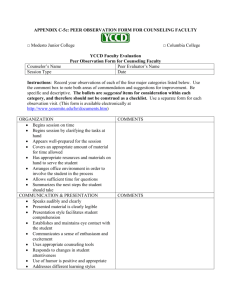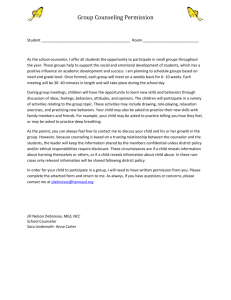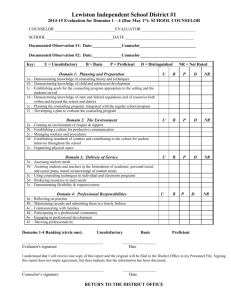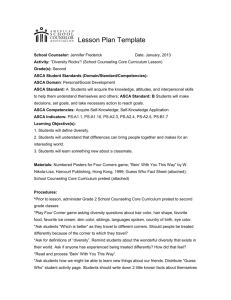Fall - IPFW.edu
advertisement
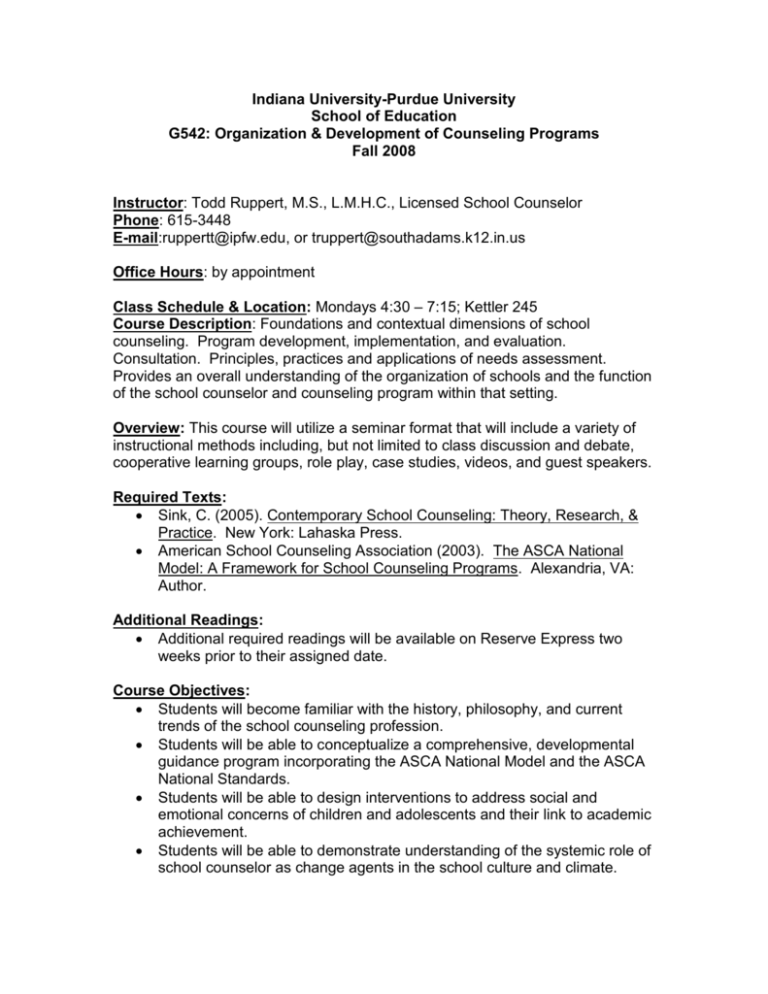
Indiana University-Purdue University School of Education G542: Organization & Development of Counseling Programs Fall 2008 Instructor: Todd Ruppert, M.S., L.M.H.C., Licensed School Counselor Phone: 615-3448 E-mail:ruppertt@ipfw.edu, or truppert@southadams.k12.in.us Office Hours: by appointment Class Schedule & Location: Mondays 4:30 – 7:15; Kettler 245 Course Description: Foundations and contextual dimensions of school counseling. Program development, implementation, and evaluation. Consultation. Principles, practices and applications of needs assessment. Provides an overall understanding of the organization of schools and the function of the school counselor and counseling program within that setting. Overview: This course will utilize a seminar format that will include a variety of instructional methods including, but not limited to class discussion and debate, cooperative learning groups, role play, case studies, videos, and guest speakers. Required Texts: Sink, C. (2005). Contemporary School Counseling: Theory, Research, & Practice. New York: Lahaska Press. American School Counseling Association (2003). The ASCA National Model: A Framework for School Counseling Programs. Alexandria, VA: Author. Additional Readings: Additional required readings will be available on Reserve Express two weeks prior to their assigned date. Course Objectives: Students will become familiar with the history, philosophy, and current trends of the school counseling profession. Students will be able to conceptualize a comprehensive, developmental guidance program incorporating the ASCA National Model and the ASCA National Standards. Students will be able to design interventions to address social and emotional concerns of children and adolescents and their link to academic achievement. Students will be able to demonstrate understanding of the systemic role of school counselor as change agents in the school culture and climate. Students will become familiar with current research and best practices in the school counseling literature. Students will be able to demonstrate understanding of legal and ethical guidelines and issues for work in school settings. Course Requirements: 1. Reading Discussions: This seminar course necessitates that each student completes the assigned readings and come fully prepared to participate in class discussions each week. Thus, each week you will be expected to bring a journal entry based upon the required readings. A separate sheet explaining what needs to be included in the journal entries will be given at the first class. (Please bring two typed copies of your entry; 1 for yourself and 1 for the instructor). 2. Guidance Curriculum Review Assignment: The purpose of this assignment is to expose you to the numerous commercial guidance resources available, and to allow you to develop your skills in conducting guidance lessons. The assignment has two parts: a) Identify and carefully review one commercially available guidance curriculum resource. Write a two page summary and critique of the materials, and provide copies for each class member. The National Standards addressed in the materials should be included. Be prepared to discuss your review in class. b) Develop one guidance lesson from the materials to be presented in class. The lesson should be presented as you would present to a K-12 classroom. You should go beyond the commercial lesson to include additional resources, ideas, etc. to make your own. The lesson should be clearly linked to the ASCA National Standards. 3. Intervention Case Study: The purpose of this assignment is to enable you to practice and to develop appropriate school-based interventions for various school-related problems. You will be given a hypothetical student situation, and you will be responsible for developing an intervention plan that includes both individual and systemic interventions. More information will be provided in class. ** This assignment is a portfolio item. 4. Special Problems in the Classroom Assignment: The purpose of this assignment is to help you to begin expertise as a consultant to teachers and parents on mental health and developmental issues. You will identify a specific disorder, developmental issue, or other relevant topic (to be discussed with me in advance), and research the implications of and interventions for this issue in the school. You will develop two handouts related to this topic: one two-page handout targeted toward teachers, and another two-page hand-out targeted toward parents. The hand-outs should include information relevant to the parents and teachers, should discuss implications for the child, and should discuss recommendations to address the mental health or developmental issue. 5. Final Reflection Paper: The purpose of this assignment is to allow you to reflect on and integrate the different course topics and to allow you to demonstrate your understanding of the role of a school counselor. This will be a 5-7 page reflection paper; specific expectations will be distributed in class. 6. Optional Extra Credit: By attending the ISCA Fall Conference, you may earn 70 points of extra credit by submitting a 2-3 page reflection paper on that experience. The state school counselor conference is a wonderful opportunity to enrich your learning about the profession, discover what topics are relevant to school counselors today, and network with colleagues. Evaluation & Grading: Reading Discussions /Journaling: Guidance Curriculum Review: School Intervention Case Study: Special Problems Assignment: Final Reflection Paper: TOTAL = 200 pts. 100 pts. 200 pts. 100 pts. 100 pts. 700 pts. 700-655 = A 654-627 = A626-606 = B+ 605-578 = B 577-557 = B556-536 = C+ 535-508 = C 507-487 = C486-466 = D+ 465-438 = D 437-417 = D416-0 = F ** If you are going to miss a class or be late, you must contact the instructor. You are responsible to make-up any information missed. More than two absences will result in a reduction of one letter grade for the course. Class Schedule Aug 25 Introduction to the course: Defining School Counselors and School Counselor Programs Sep 1 NO CLASS: LABOR DAY Sep 8 School Counseling: Past, Present, and Future Sink Ch. 1 ASCA Introduction & Ch. 1-4 Galassi & Akos, 2004 Begin Guidance Curriculum Review Assignment Journal Entry 1 (due) Sep 15 Developmental Guidance & the National Standards Dahir (2001) ASCA Standards (Appendix p. 81-86) Baker & Gerler, Ch. 2 Paisley (2001) Sm. Group/Peer Critique of Guidance Curriculum Review Journal Entry 2 (due) Sep 22 Coordination Function: Sink Ch. 5 ASCA Ch. 5 & 7 Herr (2001) Comprehensive Guidance Programs Coordination Function: Large Group Guidance Sink Ch. 6 Guidance Curriculum Review: Summary/Presentation & Journal Entry 3 (due) Sep 29 Assessment Baker Ch. 10 Begin Intervention Case Study Assignment Journal Entry 4 (due) Oct 6 Coordination Function: Individual Planning Sink Ch. 7 Blustein et. al. (2000) Sm. Group/Peer Critique Intervention Case Study Journal Entry 5 (due) Oct 13 NO CLASS: FALL BREAK Oct 20 Counseling Function: Individual Counseling Sink Ch. 2 Lockhart & Keys (1998) Intervention Case Study & Journal Entry 6 (due) Oct 27 Counseling Function: Group & Family Counseling Sink Ch. 3 & 4 Ripley & Goodnough (2001) Kraus (1998) Journal Entry 7 (due) Nov 3 Counseling Function: Special Populations Wittmer Ch. 11 & 12 (chapters will be handed out in class) Begin Special Problems in the Classroom Assignment Journal Entry 8 (due) Nov.10 WORK DAY: Class does not meet; students are encouraged to continue preparation of their Special Problems in the Classroom assignment; class-time is also being given to work individually or collaboratively with their chosen partner for this assignment Nov 17 Systemic Change: Consultation, Collaboration & Leadership Sink Ch. 9 – 11 Keys (1999) Litrell & Peterson (2001) Sm. Group/Peer Critique Special Problems in the Classroom Journal 9 (due) Nov 24 Play Therapy, and the Natural Helpers Training Model Fall (1999) Special Problems in the Classroom Assignment Presentations & Journal 10 (due) Dec. 1 Issues in Elementary, Middle, & High School Guidance Complete any unfinished Special Problems in the Classroom Presentations Panel of Counselors Begin Final Reflection Paper Dec 8 Professional Issues: To Internship & Beyond Bring Graduate Manual; Discuss Internship questions/needs Class Dinner Final Reflection Paper (due) Dec 15 No final in this course. Relax. Enjoy your winter break! Additional Important Information * The instructor reserves the right to modify and / or change the course syllabus as needed during the course. In case of the cancellation of a class session, the instructor will modify the course syllabus to cover relevant topics. Cancelled classes will not be made up. STUDENTS ARE REMINDED TO RETAIN NOTES, EXAMS AND PAPERS IF THIS COURSE IS PART OF THE COMPREHENSIVE EXAM REQUIRED FOR GRADUATION. SEE THE “GRADUATE STUDENT ORIENTATION HANDBOOK” FOR FURTHER DETAILS. * The IPFW Student Handbook and the Counselor Education Orientation Handbook describe policies regarding to matters of attendance, plagiarism and grade appeal. Please familiarize yourself with these policies. * Weather Cancellations- 481-5770 or 481-6050 *If you have or acquire a disability and would like to find out what special services and accommodations may be available to you, contact services for students with disabilities in Wu 118 & 218, voice/tty. * As a professional counselor, much of your communication with other professionals will be in writing. Students are encouraged to visit the Writing Center at Kettler G35 if the quality of their writing in all assignments does not meet the standard expected of a graduate student. Students may sign up for an appointment or walk-in for help (priority is given to those with appointments). The Writing Center staff will not revise, edit, or proofread your papers for you, but will help you learn how to better to do this on your own. You can get free help brainstorming, developing, and organizing ideas, and learning how to revise and edit final drafts by visiting the writing center, Kettler G35, open daily except Saturday. * Dr. Utesch’s courses only: All papers & materials submitted will be retained by the professor unless otherwise noted. Should you desire copies of submitted material, please make duplicates prior to submission. * Issues related to student diversity will be addressed in each of the courses in the Counselor Education Program. This means that differences in individuals and groups will be discussed. It is our understanding that different contexts result in different world views. Counselors must always be sensitive to the possible differences in perception and belief that exist outside of their own. IPFW SCHOOL OF EDUCATION MISSION STATEMENT (adopted January 10, 1996) To prepare professionals in teaching, counseling, and leadership who demonstrate the capacity and willingness to continuously improve schools and related entities so that they become more effective with their clients by: Becoming more caring, humane, and functional citizens in a global, multicultural, democratic society; Improving the human condition by creating positive learning environments; Becoming change agents by demonstrating reflective professional practice; Solving client problems through clear, creative analyses; Assessing client performance and creating and executing effective teaching, counseling, and educational leadership by utilizing a variety of methodologies reflecting current related research; Utilizing interdisciplinary scholarship, demonstrating technological and critical literacy, and effectively communicating with all stakeholders. IPFW SCHOOL OF EDUCATION (SOE) CONCEPTUAL FRAMEWORK: A LEARNING AND LEADERSHIP MODEL We in the School of Education are committed to the following conceptual framework for our program: Democracy and Community Effective educators, such as teachers, counselors, and administrators need to be part of a dynamic educational community as a model for the climate of community they hope to create. To do this, these educators need an understanding of the moral, cultural, social, political, and economic foundations of our society. Consequently, the SOE should foster a democratic, just, inclusive learning community among its students, faculty, and staff, and with all other stakeholders in the educational enterprise. Habits of Mind Effective educators realize that knowledge alone is not sufficient. They practice critical reflection in all endeavors. Within the context of a compassionate, caring community, educators foster habits of mind necessary to engage learners, such as investigating, inquiring, challenging, critiquing, questioning, and evaluating. Consequently, the SOE must integrate critical habits of mind in all aspects of the teaching/learning process. Pedagogy Effective educators need to understand multiple approaches to pedagogy as well as the multiple roles of the teacher, such as facilitator, guide, role model, scholar, and motivator. Educators appreciate and are receptive to the diverse perspectives, modes of understanding, and social circumstances that they and their students bring to the educational setting. Consequently, the SOE needs to prepare educators to understand and use pedagogy creatively and thereby ensure active learning, conceptual understanding, and meaningful growth. Knowledge Effective educators need to be well-grounded in the content which they expect to teach. Educators need to understand how knowledge is constructed, how the processes of inquiry are applied, how domains of knowledge are established, how disciplines can be integrated and most effectively communicated to their students. Educators also need understanding of themselves, of communities in which they intend to teach and of students. Consequently, the SOE should immerse educators in nurturing learning communities that deepen knowledge, and encourage on-going intellectual, emotional, and personal growth. Experience Effective educators learn their craft through experiences in actual educational settings. Through on-site campus activities and field-based experiences, students will observe and emulate exemplary teaching and learning. These educators will practice, collaborate, and interact with practitioners and their students. Consequently, the SOE must integrate field and/or clinical experiences that reflect the diversity of educators, students, and schools into all aspects of the curriculum, and help educators to assess and reflect on those experiences. Leadership Effective educators are leaders. They have developed educational and social visions informed by historical and cultural perspectives. They strive to set the highest goals for themselves and inspire students to do likewise. Educators are enriched by the convergence of knowledge, theory and practice as they optimistically face the educational challenges of the twenty-first century. Consequently, the SOE must provide opportunities for educators to develop as leaders in their procession and in their communities. Todd Ruppert, M.S., is a full-time school counselor. He holds a masters degree in mental health counseling from the University of St. Francis, and holds licenses both as a school counselor and as a mental health counselor. He has experience as a former social worker, and thus has served children, parents, and community members as a professional child advocate for the last fifteen years.


